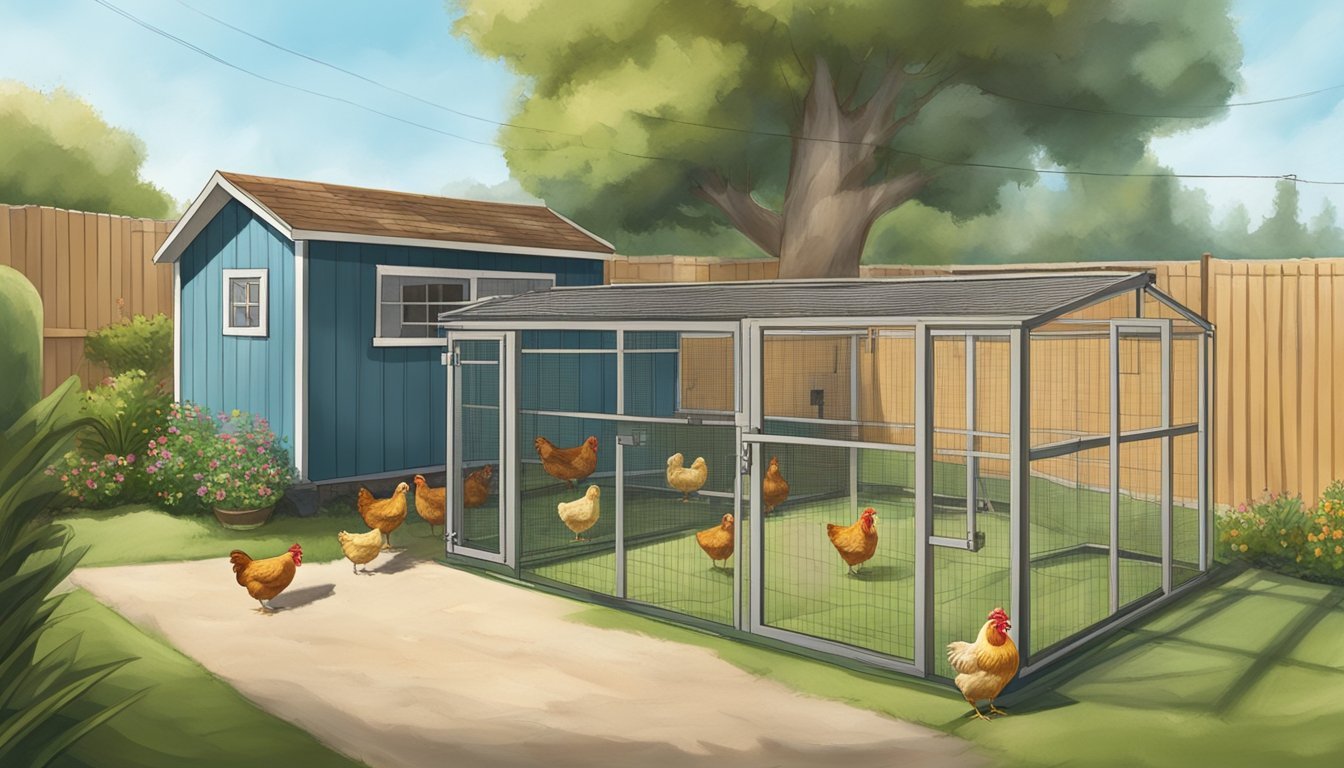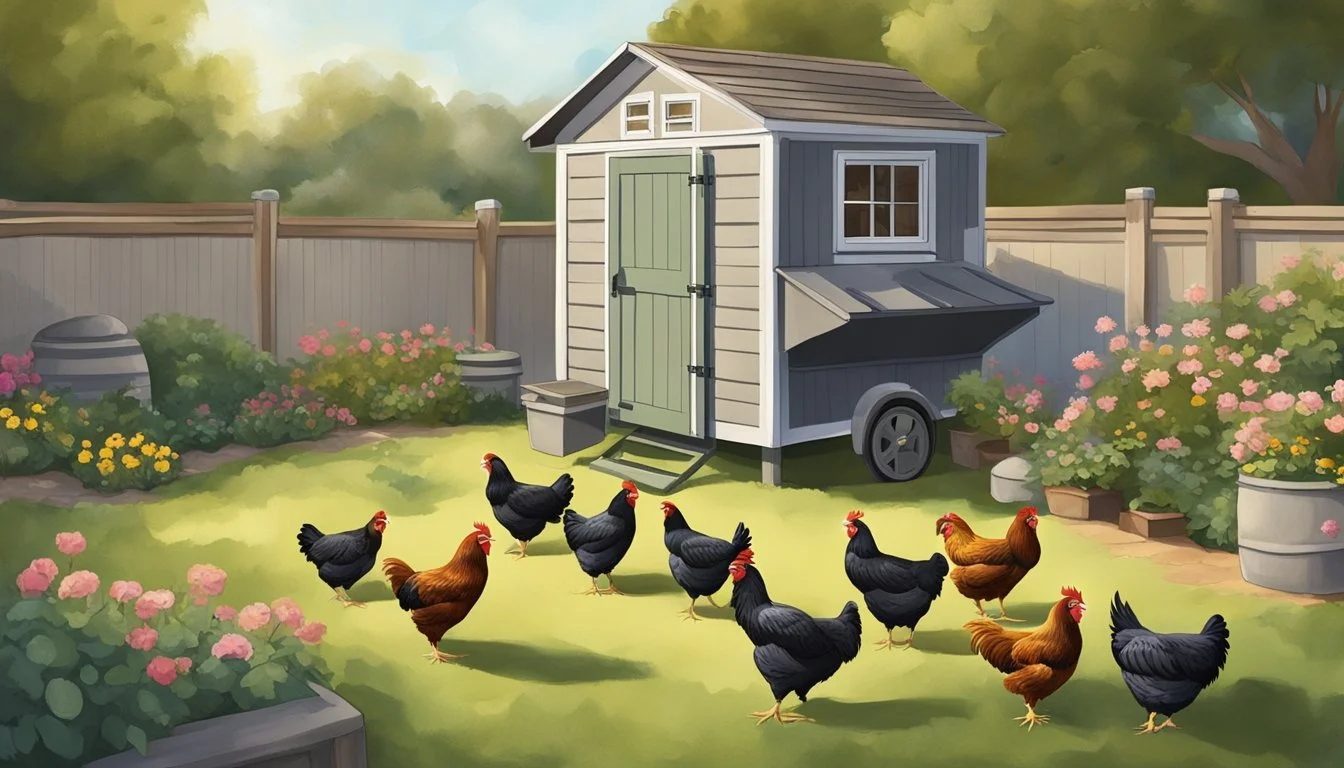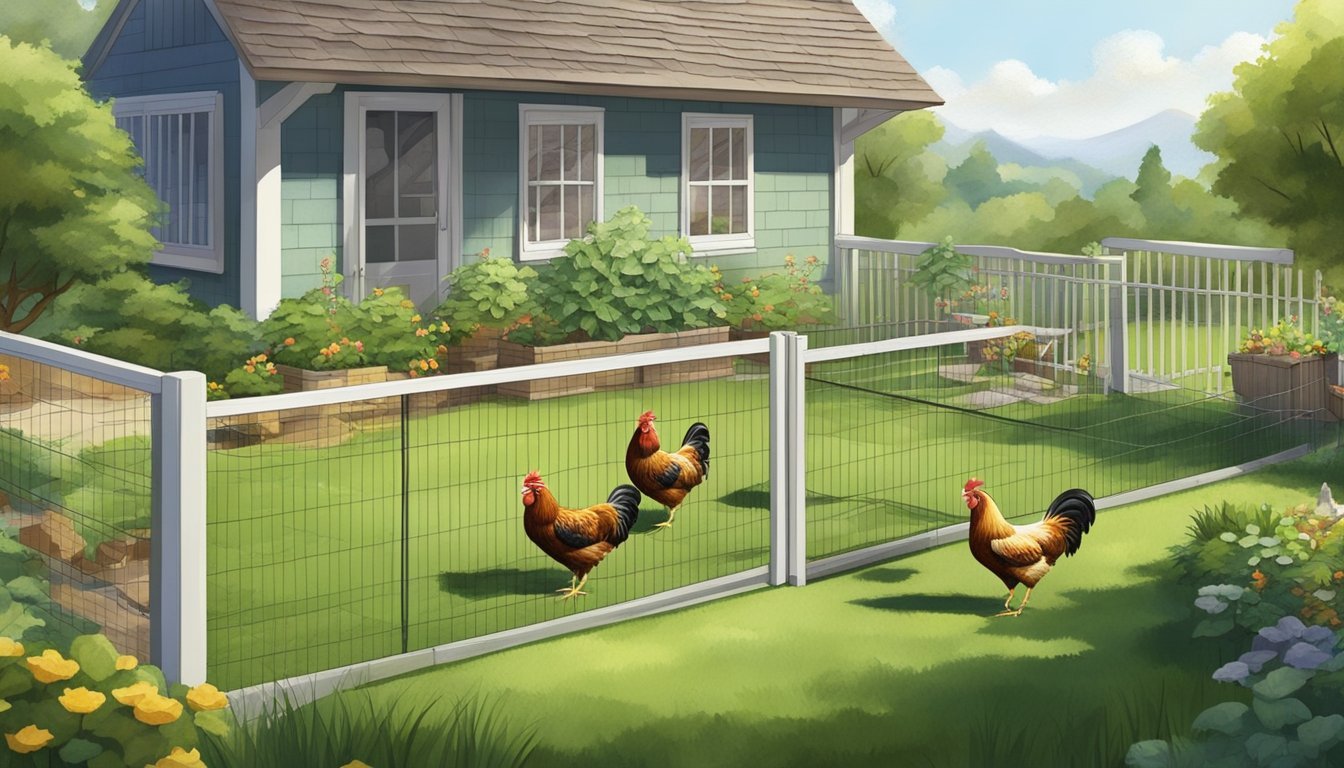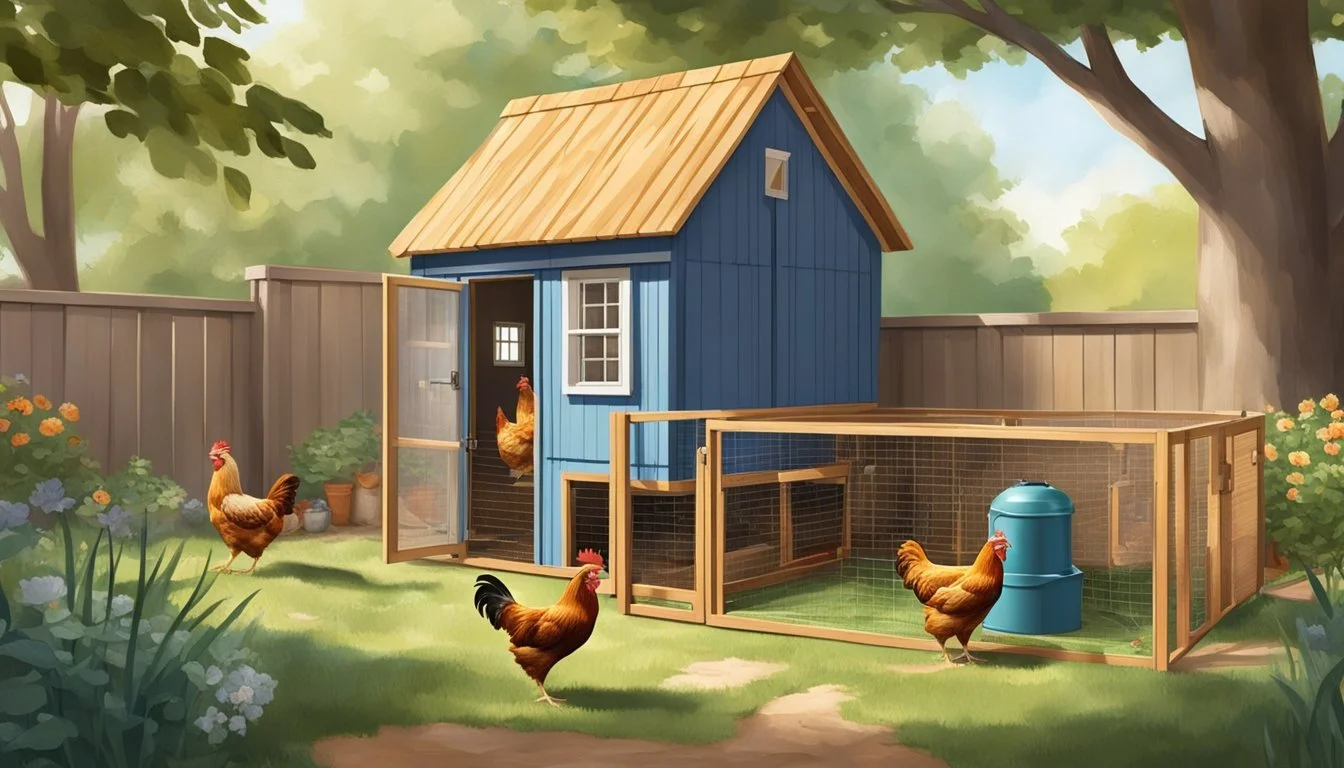Keeping Backyard Chickens in Huntington Beach, CA
Essential Tips for Urban Poultry Farming
Residents of Huntington Beach, California who pursue the pleasures of raising backyard chickens join a growing community of urban and suburban poultry enthusiasts. In this coastal city, nestled in Orange County, keeping chickens provides a host of rewards, from the joy of interacting with these social creatures to the benefit of fresh eggs. The local climate is generally favorable for poultry, boasting mild winters and warm summers, which is conducive to raising healthy flocks.
However, keeping chickens in Huntington Beach is subject to city ordinances designed to ensure both animal welfare and community harmony. The city stipulates that no person shall allow fowl or rabbits to roam at large, categorizing such an act as a nuisance. To maintain a backyard flock, residents must comply with the regulation that limits the number of chickens and requires them to be confined within their property. Additionally, while hens are welcome in local backyards, roosters are not permitted due to their noise, which can disturb the peace in residential areas.
These regulations underline the importance of understanding and adhering to local laws when undertaking the responsibility of raising backyard chickens. It's crucial for potential poultry keepers to engage with relevant city departments or resources to ensure their endeavor aligns with legal requirements, supports animal health, and respects the comfort of their neighbors.
Legalities of Owning Backyard Chickens
Residents of Huntington Beach, California interested in keeping backyard chickens must navigate the specific municipal codes and permit requirements. Adherence to zoning laws, coop restrictions, and awareness of potential penalties are crucial for legally raising chickens in residential areas.
Understanding Huntington Beach Municipal Codes
Municipal codes in Huntington Beach outline that the keeping of chickens is considered legal, but with stipulations. Under Section 7.12.110, it is prohibited for any poultry, including chickens, to be at large within the city. This means residents must ensure their chickens are securely contained within their property.
Permit Requirements for Keeping Chickens
To own chickens within the city, residents must obtain a backyard chicken permit. This ensures that the city has a record of all poultry being raised in residential areas. The permit covers a range of poultry but stipulates a maximum number of 6 chickens per household.
Zoning Laws and Residential Areas
Zoning laws in Huntington Beach determine where chickens may be kept. Residential areas are generally zoned for such practices, but it’s essential for residents to verify if their specific residential area is zoned for keeping chickens, as geographic restrictions may apply.
Distance and Coop Restrictions
There are regulations concerning the distance chicken coops must be kept from neighboring homes and property lines. Such measures are intended to minimize any nuisance to neighbors and to maintain a clean, safe environment for both the chickens and the community.
Penalties for Violation
Failure to comply with the city's chicken laws, permit requirements, or coop restrictions can result in penalties, typically in the form of a fine. It is vital for residents to understand these codes and adhere to them to avoid any legal consequences the city may impose for non-compliance.
Setting Up Your Chicken Coop
Setting up a durable and safe chicken coop in Huntington Beach, CA, is essential for the health and wellbeing of backyard chickens. Proper design complements local climate conditions, and ensures protection from predators and disease.
Choosing the Right Location
The optimal location for a chicken coop should offer adequate sunlight and natural shade, with good drainage to avoid water accumulation. It must also observe local ordinances, such as maintaining a certain distance from neighbors' properties and following any city-specific rules for poultry housing.
Sunlight: Essential for the chickens' health and wellbeing.
Drainage: Prevents the accumulation of water and subsequent health issues.
Designing the Coop and Runs
The coop must be a sturdy structure used as a dwelling for chickens, capable of keeping them dry and ventilated. An important aspect of designing coops and runs includes providing ample space for the chickens to move, forage, and express natural behaviors.
Space Requirements: At least 4 square feet per chicken inside the coop and 10 square feet in the run.
Ventilation: Adequate air flow without causing drafts to avoid respiratory diseases.
Protecting from Predators and Disease
Chickens are susceptible to predation and disease, making coop security and cleanliness paramount. Solid construction using hardware cloth and secure latches can prevent predator access. Regular cleaning, removing waste, and disinfecting the coop helps prevent diseases.
Predator Deterrence: Use 1/4-inch hardware cloth for secure enclosures.
Disease Prevention: Establish a cleaning routine to maintain a sanitary environment for poultry health.
Health and Maintenance
Maintaining the health of backyard chickens in Huntington Beach requires consistent care and attention to their feeding, living conditions, and health monitoring. These efforts ensure clean conditions, disease prevention, and the production of fresh eggs.
Feeding and Nutrition
A balanced diet is critical for the chickens' health and the quality of the eggs they produce. Owners must provide a mix of commercial poultry feed and access to pasture for foraging. The poultry feed should be rich in proteins, vitamins, and minerals. Supplemental foods like grains, vegetables, and occasional fruits can be offered, but treats should not exceed 10% of their total diet. Fresh, clean water should always be available.
Regular Cleaning Procedures
Clean and sanitary conditions are non-negotiable to prevent disease and ensure overall well-being. Coops must be cleaned regularly, which includes:
Daily: Remove droppings and leftover food.
Weekly: Change bedding, scrub and disinfect waterers and feeders.
Monthly: Conduct a thorough clean of the entire coop, removing all bedding, inspecting for pest infestations, and applying fresh bedding.
Monitoring Chicken Health
Vigilance in observing chickens daily is essential for early detection of potential health issues. Indicators of poor health may include changes in eating or laying habits, lethargy, or abnormal droppings. Prevention is crucial, so vaccinating against common diseases and providing parasite control measures is recommended. Any signs of illness should prompt immediate consultation with a veterinarian experienced in poultry health.
Local Chicken Resources
When considering raising backyard chickens in Huntington Beach, CA, it is important for potential poultry keepers to connect with local resources for obtaining chicks and finding community support. These resources are vital for navigating local ordinances and understanding best practices for raising healthy chickens within city limits.
Buying Chicks from Local Hatcheries
Prospective chicken owners should start their journey by sourcing chicks from reputable local hatcheries. Local hatcheries are knowledgeable about Huntington Beach's regulations, which include a limit to 4 hens and no roosters. These hatcheries often offer a variety of breeds suitable for the Southern California climate.
SoCal Chickens: Offers a wide range of chicks and provides guidance for first-time owners.
Beach City Chickens: Specializes in hens that thrive in local urban settings and adheres to Huntington Beach guidelines.
The hatcheries typically start selling chicks in the early spring, aligning with school science projects and 4-H clubs, making it an educational experience for students interested in poultry.
Community Support Groups
Community support groups serve as an invaluable platform for sharing experiences, acquiring tips, and staying informed about the nuances of urban chicken keeping.
Huntington Beach Chicken Enthusiasts: A popular blog that provides regular updates on chicken care, coop design, and city regulations.
SoCal Poultry Network: A collective of poultry owners in the Southern California area, including Los Angeles, Long Beach, and Anaheim, offering advice and support.
These groups often hold meetings and are active online, fostering a sense of community and shared learning among local chicken aficionados.
Understanding Chicken Behavior
Before deciding to keep backyard chickens in Huntington Beach, CA, it's essential to grasp the typical behaviors they exhibit. Recognizing these behaviors can help in managing a flock and ensuring they do not become a nuisance to the community.
Social Structure of Chicken Flocks
Chickens maintain a well-defined social hierarchy, often referred to as the "pecking order." At the top of this structure are the dominant birds, typically the roosters, followed by the hens according to their level of dominance. New chickens introduced to an existing flock must find their place in this hierarchy, which can lead to initial conflicts until the pecking order is established. These complex social dynamics are crucial for maintaining order and peace within the flock.
Dominance: Established through pecking and other behaviors.
Hierarchy: Influences feeding, nesting, and roaming patterns.
Dealing with Nuisance Behaviors
Nuisance behaviors in chickens, including noise, especially from roosters, and destructive pecking, must be managed to maintain harmony within the flock and neighborhood. Roosters are renowned for their crowing, which can be problematic in urban settings such as Huntington Beach, where noise ordinances might be in place.
Roosters' crowing: Can be limited by keeping a smaller number of hens or rehoming roosters.
Destructive behavior: Mitigated by providing enough space, enrichment, and proper roosting areas.
Chickens exhibit these behaviors due to various factors, including their sex, with roosters being naturally more prone to assertive and loud conduct compared to hens. Addressing nuisance behaviors early on is key to successfully integrating chickens into a residential area without infringing upon local animal regulations.
Common Restrictions and Considerations
Huntington Beach has specific regulations regarding the keeping of backyard chickens which are important for maintaining harmony in residential areas and ensuring animal welfare.
The Importance of Chicken Sex Determination
In Huntington Beach, CA, the sex of chickens is a key factor for backyard poultry enthusiasts. Roosters are typically prohibited due to noise concerns, thus only hens are allowed. Residents must be skilled in sex determination or seek professional assistance to avoid the accidental rearing of roosters, which can lead to violations and nuisances in neighborhoods.
Number and Types of Chickens Allowed
The city permits a certain number of chickens based on the size of a resident's property. However, specifics such as the maximum number of chickens allowed, and whether other fowl like ducks or breeds like bantams are included, should be verified directly with Orange County Animal Care Services. Generally, urban settings restrict livestock quantities to prevent over-crowding and to minimize potential disturbances to the community.
Potential Impact on Neighbors
Backyard chickens in Huntington Beach must be kept in a manner that does not impact neighbors negatively. Key considerations include:
Nuisance: Excessive noise or odors can be considered a nuisance.
Distance Requirements: Coops and runs should maintain proper distance from adjacent properties to reduce any disturbances.
Waste Management: Proper disposal of chicken waste is crucial to avoid odors and maintain sanitary conditions.
Residents must take into account how their chicken-keeping practices might affect their immediate community, adhering to guidelines set forth to maintain neighborhood peace and public health.
Complementary Practices
When residents of Huntington Beach keep chickens in their backyard, they have the opportunity to engage in sustainable practices that benefit both their garden and household.
Benefiting from Chicken Manure
Chicken manure is an excellent source of nitrogen, phosphorus, and potassium, which are essential nutrients for plant growth. Proper composting of manure is crucial to kill pathogens and convert it into a safer form for garden use. Here are steps to safely compost chicken manure:
Collect fresh manure from your chickens.
Combine with carbon-rich materials such as leaves or straw to balance nitrogen.
Maintain the compost pile, keeping it moist and regularly turning it to improve aeration.
Wait for the compost pile to heat up and then cool down, indicating the composting process is complete.
Once composted, chicken manure can be applied to gardens to enrich soil fertility, leading to more robust plant growth and, consequently, a more productive garden.
Integrating with Home Gardening
By incorporating chickens into their home gardening practices, Huntington Beach residents can create an integrated ecosystem in their backyard. Chickens can contribute to pest control by eating common garden pests. Furthermore, the fresh eggs produced by the chickens are a tangible benefit, providing a local and sustainable source of nutrition.
To maximize the effectiveness of incorporating chickens with gardening, residents can follow these pointers:
Designate a specific area for chickens to roam where they can forage without damaging sensitive plants.
Rotate chickens through different garden sections to allow soil recovery.
Use a chicken tractor, a movable coop, that lets chickens graze and fertilize different parts of the garden without causing harm.
By thoughtfully integrating chickens into gardening practices, individuals can experience the benefits of these complementary systems, enhancing their self-reliance and contributing to a sustainable lifestyle.
Comparative Insights
This section provides an analytical overview of local ordinances related to chicken keeping in Huntington Beach compared to nearby cities, and the advantages of raising backyard chickens in these areas.
Chicken Keeping Laws in Nearby Cities
Huntington Beach permits residents to keep chickens, but with certain restrictions to minimize nuisances. A comparison with nearby cities reveals a patchwork of regulations:
Long Beach: Similar to Huntington Beach, allows urban chicken farming while imposing regulations to address concerns such as noise and odors.
San Diego: Backyard chickens are allowed with stipulations concerning the distance of coops from neighboring residences.
San Jose & Oakland: Both cities have embraced urban agriculture, permitting backyard chickens under specific local laws that focus on coop placement and maintenance.
Sacramento: Recognizes the value of urban chickens, with ordinances in place that dictate the number of chickens allowed and coop requirements.
Fresno, Bakersfield, Stockton: Each city has its own unique regulations, ranging from outright bans to lax rules, emphasizing the importance of reviewing local guidelines before starting a chicken coop.
Advantages of Raising Backyard Chickens
Residents of Huntington Beach and surrounding cities who comply with local regulations can enjoy several benefits of backyard chicken raising:
Freshness and Food Security: Home-raised chickens provide a steady supply of fresh eggs, contributing to household food security.
Sustainability: Backyard chickens contribute to a sustainable lifestyle by producing organic eggs and reducing food waste through their diet, as they can consume kitchen scraps.
Educational Value: Raising chickens can offer a rich educational experience, teaching responsibility and the basics of animal care to children and adults alike.
Cities like Huntington Beach and their neighbors often allow the keeping of chickens as pets under specific local regulations, providing residents with unique opportunities for sustainable living and closer connection to their food sources.









